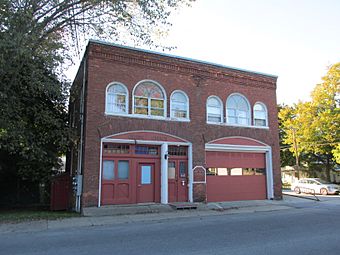W. H. Bradford Hook and Ladder Fire House facts for kids
Quick facts for kids |
|
|
W.H. Bradford Hook and Ladder Fire House
|
|
 |
|
| Location | 212 Safford St., Bennington, Vermont |
|---|---|
| Area | 0.3 acres (0.12 ha) |
| Built | 1893 |
| Architect | Russell & March |
| NRHP reference No. | 99001295 |
| Added to NRHP | October 28, 1999 |
The W.H. Bradford Hook and Ladder Fire House is a very old fire station in Bennington, Vermont. It was built in 1893 and 1894. For more than 100 years, this building served as a fire station for the town. It still looks much like it did when it was new. Today, the building has been changed into art studios and homes. It was added to the National Register of Historic Places in 1999 because of its history.
Contents
What is the Bradford Fire House Like?
The Bradford Hook and Ladder Fire House is just outside downtown Bennington. It is on the corner of Safford and Gage Streets. The area around it has mostly houses. There is also a park across the street.
Building Design
The fire station is made of brick. It has two floors. On the first floor, there are two large openings for fire trucks. One opening has a modern garage door. The other opening has been changed. It now has three smaller sections. Two of these sections are doors for people. The third section has windows. Above these sections are special windows called transom windows. These windows are split into two levels.
On the second floor, above each truck opening, there are three round-top windows. The middle window is larger than the two windows next to it. Inside the building, many of the original parts are still there. This includes the wooden ceiling on the second floor.
History of the Fire House
The fire station was built between 1893 and 1894. When it first opened, it held two different fire companies. One was the W.H. Bradford Hook Company. The other was the F.M. Tiffany Hose Company.
Early Firefighting Equipment
Back then, fire equipment was pulled by horses. The building also had a tall tower. This tower was used to dry the fire hoses. Hoses could rot if they stayed wet. The drying tower was taken down in 1912. A small shed replaced it, but that shed was also removed later.
In the 1920s, one of the truck openings was changed. It became the office for the fire chief. The fire station was used actively until 1997. After that, it was changed into art studios and places for people to live.



